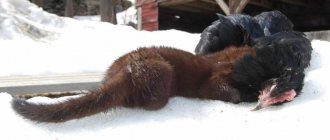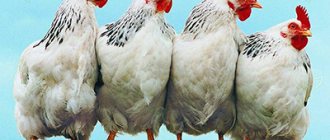Pets require constant care and maintenance of their immunity. But major ferret diseases often occur even with a carefully selected diet and constant cleaning of the animal’s habitat. There can be many reasons for this, from the weakness of the individual from birth to stressful situations due to moving and the appearance of new pets in the house. Any disturbances in ferrets require consultation with a veterinarian and subsequent treatment with properly selected medications.
Ferrets can suffer from infectious and parasitic diseases
You can read about what to feed your ferret at home in our article here.
Infectious diseases of ferrets
Parasites in ferrets
The most common problems diagnosed in pets are fleas and ear mites. Infection with the first type of parasites occurs due to direct or indirect contact with other domestic animals, in particular dogs and cats. Fleas of human origin are often found on ferrets. When these parasites appear, they cause constant itching throughout the body. In addition, fleas are carriers of dangerous helminths that enter the animal’s body after a bite. The eggs quickly spread through the bloodstream to all tissues and organs. The main period for the appearance of fleas is summer and the warm months of spring and autumn.
Constant itching in a pet is a sign of fleas or ticks
Attention! In some ferrets, the appearance of fleas causes an acute allergic reaction. It is accompanied by severe itching, constant neurosis and the desire to itch. As a result, wounds appear on the animal’s body where bacteria can enter. It is not uncommon for ferrets to experience hair loss with this type of allergy.
Otodecotosis, another name for ear mites, is provoked by the influence of a carpet beetle mite. It actively multiplies in the area of the inner ear and external auditory canal. A person cannot suffer from this parasite, but he can become a carrier of the causative agent of otodecticosis to other pets. Infection with parasites also occurs through direct contact with a sick animal and through the use of common pet care items.
When ear mites appear, the animal’s skin suffers greatly, it is constantly irritated, and the ferret suffers from itching. At the same time, bacteria enter the wounds, causing suppuration and inflammation of the affected epidermis. Additionally, with otodecticosis, strong discharge from the ears is recorded, which is black in color and has an unpleasant odor.
You should constantly monitor the condition of the auricle for the presence of mites.
Attention! An ear mite diagnosis can be made after scraping and examining the material through a microscope.
Treatment of ear mites and fleas is carried out using the same means. One of the most effective of them is the drug in the form of drops Fiprist Combo. The medicine is sold in the form of a pipette, inside of which there is the active substance fipronil and S-methoprene. To rid your ferret of parasites, you need to carefully open the pipette and distribute the contents over the entire surface of the spine, starting from the back of the head. During the procedure, it is necessary to avoid getting liquid into the animal’s eyes. If necessary, the treatment procedure is carried out after a month.
Ferrets get fleas from other pets
Attention! To get the maximum effect, the animal is prohibited from bathing for 48 hours after applying Fiprist Combo.
Video - Otodectosis in a ferret
Prevention
Vaccination is considered the most important preventive measure that can protect ferrets from mortal danger. The first vaccination is done at three months, when young rodents and ferrets have already replaced their milk teeth with permanent ones. Before vaccination, treatment is carried out against fleas, ticks, and other parasites.
Subsequently, preventive vaccination is carried out annually in the absence of contraindications.
In addition to routine vaccination, the key to having a healthy pet should be:
- balanced diet;
- proper conditions of detention;
- compliance with hygienic rules for grooming, bathing, and drying. Only products specifically designed for this purpose are used - human shampoos are strictly contraindicated and can provoke skin inflammation, for example, dermatitis, which ferrets tolerate quite difficult, and untimely treatment of the disease is fraught with more serious complications;
In addition, you should regularly show your pet to the veterinarian - a routine examination should be carried out at least once every 12 months for young ferrets, and once every six months for mature rodents.
Unfortunately, at the moment there are no proven methods that can prevent adrenal disease. It is now generally accepted that early spaying (castration), which is practiced by most breeders, directly contributes to the development of adrenal disease and in most cases, ferrets that go on sale have already been operated on. If the animal has not yet been sterilized, it is recommended to wait until it is 6 months old and only then resort to such manipulation.
Hyperadrenocorticism, we repeat, is possible in ferrets that are not castrated or castrated after reaching sexual maturity, however, this is a rare occurrence.
Recent studies have shown that light cycles also contribute to the development of adrenal disease. Melatonin, as mentioned above, regulates the release of GnRH. The amount of GnRH influences the stimulation of the adrenal glands. Melatonin is produced when the ferret is in complete darkness. Most modern ferrets live in the same environment as humans - with natural light during the day and a few hours in the evening.
Read more: Treatment of grapes in spring against pests and diseases
This apparently reduces the amount of time the ferret spends in the dark, thereby reducing melatonin production. Decreased melatonin concentration means greater production and release of GnRH, which then overstimulates the adrenal glands, leading to adrenal disease. A ferret's optimal light cycle is about eight hours of light and sixteen hours of total darkness each day. It is believed that this will allow the ferret to produce the most optimal physiological amount of melatonin.
Pet owners are obliged to create the necessary conditions for their charges to function normally:
- The main condition for ensuring the health of a ferret is cleanliness. It is recommended to monitor hygiene in the cage and keep the pet clean. In this case, this means regular bathing using special shampoos.
- It is also important to monitor your ferret's diet. It is necessary to create a balanced and fortified diet that will help strengthen the animal’s immunity and avoid digestive problems.
- We must not forget about vaccination. For a number of diseases (for example, rabies or plague), only preliminary vaccinations will help to avoid infection and subsequent death of a pet. Experts have not yet found a means to combat such viruses.
Despite their unpretentiousness, ferrets are constantly at risk of getting sick. To avoid possible troubles, often leading to death, you need to know about the common ailments of these cute animals and about preventive measures that will help preserve the health and life of your pet.
Kidney disease in ferrets
The disease is one of the most common and can be fatal due to severe stagnation of urine and poisoning of the body. Pathology develops due to dysfunction of the secretion of sex hormones produced by the adrenal glands. The disease can be diagnosed at any age and usually affects ferrets over three years of age. The exact reasons leading to the development of adrenal disease of this type have not yet been identified.
A violation can be recognized by the following signs:
- rapid and massive hair loss;
- the process of hair loss begins from the tail;
- with rapidly progressing endocrinopathy, the ferret becomes bald all the way to the muzzle;
- the pet loses weight, becomes lethargic, does not want to play;
- even with sterilization, the vulva swells in females;
- in males there is a significant enlargement of the prostate;
- due to the proliferation of prostate tissue, emptying the bladder becomes difficult;
- the animal experiences discomfort during urination;
- Neutered ferrets begin to mark their territory.
Adrenal glands should only be treated by a veterinarian. He performs surgery, during which the function of producing the secretion of sex hormones is restored.
Adrenal gland disease can only be treated surgically in the clinic
Urolithiasis disease
Among the common disorders of the renal system in ferrets, urolithiasis is often recorded. A disorder occurs due to an incorrectly composed diet, which contains a large amount of plant foods, due to previously occurring infections of the urinary system and genetic predisposition.
Urolithiasis can be recognized by the following symptoms;
- frequent but difficult emptying of the bladder, the ferret has to strain a lot to do this;
- urine takes on an unnatural hue and has a distinct, pungent and unpleasant odor;
- traces of blood are visible in the urine, sand remains in the sediment;
- in severe cases, the ureter becomes completely clogged with sand, emptying becomes impossible.
Proper diet is the key to ferret kidney health
Attention! Once the ureter becomes completely clogged, the ferret first becomes depressed, then coma and death are diagnosed.
To treat, the ferret's urethra is first flushed to remove accumulated sand and stones. This is done using an antiseptic substance and general anesthesia. Therapy also requires a diet with a minimum amount of plant foods. If the urinary canal is completely blocked, urgent surgery is performed, during which the doctor removes the sand. After surgery and during the treatment of a ferret with partial blockage of the ureter, antibacterial drugs are prescribed. Antibiotics and their dosages are selected strictly by a veterinarian, after establishing the animal’s medical history, age, and gender.
Additionally, to eliminate intoxication, you will need to prescribe IVs, during which the water balance is also restored and the body is saturated with useful microelements. To monitor the animal's condition, an ultrasound examination and urine analysis are required.
An examination by a veterinarian speeds up recovery and ensures that the correct treatment is prescribed for your pet.
Attention! The diet of ferrets with urolithiasis should include not only low-toxic food, but also medicinal food, which is purchased at veterinary pharmacies.
Ferret food prices
Ferret food
Ferret sneezes and coughs: reasons, what to do (treatment)
As with any pet owner, a ferret's cough will make many people very worried.
It's important for you to know that coughing is quite common among them, as it is among other animals.
If your ferret has nasal discharge, consult a doctor immediately
A ferret is sneezing and coughing: is there any reason to panic?
A cough is defined as a strong expulsion of air from the lungs.
REFERENCE! Cough is a reflex activated when an irritant stimulates one or more cough receptors located in the respiratory system, and coughing is the body's natural defense mechanism to protect the respiratory system by clearing it of secretions and irritants.
If your ferret has nasal discharge, take him to the vet as soon as possible. While many ferrets experience nasal discharge due to minor illnesses, it is possible that your ferret may be suffering from something much more serious.
REFERENCE! Mucus, pus, or blood coming out of one or both of your pet's nostrils is called nasal secretions.
The discharge is often accompanied by sneezing, which is an involuntary expulsion of air caused by irritation of the nostrils. This may also be accompanied by gagging, which occurs when the ferret involuntarily tries to remove mucus or other fluids from the upper respiratory tract.
It is also possible that something you are using is irritating or aggravating your pet. Your little friend may be sensitive to a particular product you use, be it dryer sheets or your laundry detergent.
In general, a ferret can sneeze and cough even while washing. There is no need to sound the alarm right away. Just take a closer look at your pet.
You should be wary if the animal starts coughing or sneezing more than 6-7 times in a row. In other cases there is no cause for concern.
A ferret can catch a cold
Prevention measures
To prevent a number of diseases, it is recommended to provide your pet with appropriate living conditions. The ferret must live in cleanliness. The diet should include high-quality food, be complete and varied.
If there are other animals at home that are susceptible to the disease, then it is worth preventing the ferret from coming into contact with them. During periods of illness, it is not recommended to take the animal in your arms; it is worth creating a quiet and calm environment for it.
Do not allow people with a cold or flu near your ferret. If you have a cold, have someone else take care of your ferret until you feel better.
If you must handle the ferret yourself, wear a mask and wash your hands before handling the ferret.
Ferret Anemia
This disorder develops in females during adulthood, when they do not have a mating partner. Due to the large amount of sex hormones estrogen, the animal is provoked into prolonged estrus. Because of this, the body stops producing red and leukocyte masses, and the bone marrow begins to suffer. Eventually, the female develops severe anemia, which may be accompanied by secondary infectious disorders.
Since the female herself cannot come out of a state of prolonged estrus, her entire body begins to suffer. Bone marrow problems include symptoms such as high fever and poor appetite. Elevated body temperature can be recorded for several months. Sometimes the female begins to go bald. The main cause of death in animals with aplastic anemia is bleeding, which occurs due to low levels of red blood cells.
The treatment for this problem is to mate consistently with a partner. If such measures are not planned by the ferret's owner, the female must be sterilized by a veterinarian.
The female ferret requires regular matings, they protect against prolonged estrus
Aleutian disease
A virus that often occurs in minks, but does not bypass ferrets. When rodents are affected, Aleutian disease affects the immune system and proceeds so secretly that it is very difficult to notice. In many cases, it is possible to diagnose Aleutian disease only after the death of the animal, after an autopsy.
A feature of the course of Aleutian ferret disease is considered to be an increase in the number of antibodies and their accumulation in the tissues of the entire body, which ultimately leads to inflammation.
The virus is transmitted through all biological fluids of animals.
Symptoms: the animal loses its appetite, which is why it begins to rapidly lose body weight. The ferret becomes lethargic, stops playing and spends most of its time lying down. From the gastrointestinal tract there are attacks of vomiting and frequent diarrhea. Instead of food, a sick ferret drinks a lot of liquid. A characteristic sign is a delay in molting. The coat becomes dull and becomes covered with dull sebum.
Treatment : no methods have been developed to combat Aleutian disease in ferrets, since this pathology is autoimmune in nature. There are also no vaccines that can prevent the disease.
Plague in ferrets
Pathology is one of the most dangerous and deadly. The disorder is spreading throughout the mustelid species. Ferrets become infected with the disease after direct contact with a sick animal or an animal in the incubation period. Pathogens enter a healthy body after contact with saliva, fur, household items and pet care. The virus enters the ferret's tissues through the respiratory tract and digestive system. The mortality rate in ferrets is 100%.
Attention! People can also become a source of infection with canine distemper by carrying the virus on clothes and shoes, rodents, birds, and some insects.
Plague is a fatal disease, death occurs in 100% of cases
The symptoms of the disease are clear and make it possible to recognize canine plague without errors. The latent period lasts one to three weeks. There are known cases of the disease occurring at lightning speed, when the ferret dies within 24 hours from the moment of infection. In the natural course of the disease, the following symptoms are diagnosed in pets:
- inflammation of the conjunctiva with secretion of yellow-green mucus;
- increased body temperature;
- loss of appetite and redness of the epidermis in the chin area;
- hyperemia also occurs on the lips and on the skin of the anus;
- a dry crust forms in place of the red spots;
- a large amount of pus is released from the nasal passage, the ferret suffers from rhinitis;
- gradually the pet starts vomiting and loses weight;
- Secondary infections are added to the main symptoms.
There is no therapy to eliminate canine distemper; the ferret should be euthanized, since in the last days the pet suffers greatly and dies a serious death. You can protect your ferret from this disease with a vaccine, which should be done every year.
A ferret with plague should be euthanized
Treatment
When a ferret develops health problems, it is important to respond to the symptoms in a timely manner and prevent the pet’s condition from worsening. If the disease is non-contagious and harmless (for example, poisoning, which is indicated by diarrhea and an increase in temperature), then it is necessary to rinse the animal’s stomach and review the diet.
However, in a number of cases (primarily this applies to deadly diseases), any first aid for a ferret is inappropriate and pointless. You must immediately consult a doctor who will select medications or prescribe therapy and carry out the necessary procedures in a veterinary clinic. It is not recommended to treat your pet on your own, as inept actions and incorrect selection of remedies will only cause harm.
It is important to understand that in the treatment of almost any disease, the principle of an integrated approach works, including:
- drug treatment - carried out for the purpose of temporary relief of symptoms, as well as to suppress the activity of pathogenic microorganisms of infectious nature. If we are talking about intestinal problems in ferrets, taking probiotics and pribiotics against the background of general deworming of the body is indicated. The course and dosage are selected individually, based on the clinical picture of the process;
- surgical intervention - for a number of diagnoses, a surgical method of eliminating the problem is the only possible one. This is especially true for lesions of the adrenal glands, when delay in removing them can cost the “patient” his life;
- Nutrition correction is an equally important aspect of treatment. Feeding your pet should be done in small portions, and the food should contain carbohydrates and protein elements in abundance. Avoid sugar completely. A strict diet is an integral and effective part of any treatment, without which ferrets are unlikely to be able to fully recover from their illness;
Surgical method
This is the most common treatment for ferret adrenal glands and the only one that completely removes the tumor. This is also the most recommended therapy by most veterinarians. If a veterinarian does not consider surgery at all as a radical method of treatment and does not dare to carry it out, then one should think about engaging a more experienced surgeon with experience in similar operations on ferrets.
Read more: How to grow grapes from cuttings at home: step-by-step instructions in winter and spring, how to propagate
If an animal has already had surgery on one adrenal gland, but the tumor has recurred in another gland, then surgery should not be considered as the most optimal treatment option. If both adrenal glands are removed, ferrets may develop Addison's disease, which is a severe or complete deficiency of the hormones produced by the adrenal glands.
Although surgery is the only option that can completely rid a ferret of adrenal disease, it is important to realize that there are some risks associated with the invasive process. If the tumor is on the right edge of the adrenal gland, the risk of its removal is associated with the proximity of the vena cava - the largest vein in the body - and possible serious complications are sometimes not worth the risk. In such a case, the operation to remove the tumor should be cancelled.
However, any microscopic piece of damaged adrenal tissue accidentally left behind during surgery can recur again into a new tumor, either on the same side or on the opposite side. This option can always exist and, unfortunately, it is not possible to predict or predict it. It is possible both during the recovery period after surgery and in a longer period.
In any case, the veterinarian should discuss all possible risks and complications with the animal owner before making any decision on treatment for the disease. Some ferrets simply cannot undergo surgery because they are poor candidates for surgery due to either age, health, or both, and with these animals it is better and safer to try conservative, non-invasive therapy.
Flu in ferrets
Ferrets are susceptible to the influenza virus that affects humans. An animal can also become infected with the disease from another ferret, often during the incubation period. Symptoms for the flu are classic: severe runny nose, cough, fever, lacrimation, and often unstable stools. For the next 3-5 days, the animal practically does not eat, moves little, and sleeps a lot in order to overcome the disease. Young ferrets are most affected by the flu and usually require medical attention.
If you have the flu, your ferret should be seen by a doctor to prevent pneumonia.
Adult ferrets often cope with the virus on their own within a few days to two weeks. If the flu becomes complicated and does not go away, the veterinarian will prescribe treatment. Doses are selected only by a specialist, taking into account weight, condition, and the presence of symptoms of the disease. Young pets are almost always treated with antibiotics, but have a high mortality rate due to influenza.
Table No. 1. Flu medications for ferrets.
| Drug name | Group | Peculiarity |
| Amoxicillin | Antibiotic | Sometimes provokes hypoglycemia |
| Tavegil | Antihistamine | Given only once a day, despite the instructions |
| Suprastin | Antihistamine | Given no more than twice a day, despite the instructions |
| Cephalothin | Antibiotic | Use caution if you have a diseased liver or damaged kidneys |
| Anandin | Nasal drops | A universal drug that can also treat rhinitis |
| Chamomile decoction | Anti-cough | It is recommended to pour warm at least three times a day |
| Chest collection | Anti-cough | It is recommended to pour warm at least three times a day |
| Nurofen | Antipyretic | Given only at a really high temperature, it has an additional analgesic effect |
| Baytril | Antibiotic | Has a negative effect on the bone apparatus |
Only a doctor can prescribe pills for your ferret.
Attention! Gentomycin should never be used on ferrets. The antibacterial drug instantly damages the kidneys and often causes deafness. Some doctors believe that a ferret can infect its owner with the flu.
Cardiomyopathy
A disease of the animal’s heart muscle, which leads to disruption of the normal functioning of the circulatory system. Advanced forms of cardiomyopathy often cause the development of heart failure. In domestic ferrets, cardiac involvement is not uncommon and can occur in two different forms: advanced and hypertrophic. The exact reasons that could explain the appearance of heart problems in rodents have not been identified.
Symptoms : Considering the form and severity of cardiomyopathy in a ferret, the clinical picture may vary, but in most cases the signs are as follows: a sharp decrease in activity, constant drowsiness and noticeable disturbances in normal breathing. Very often, heart problems are accompanied by coughing attacks. If the disease progresses, changes in blood pressure occur, and this in turn affects the functioning of the kidneys and poor removal of fluid from the body.
Treatment : first of all, the ferret needs to be given diuretics to facilitate the functioning of the kidneys and remove fluid. To stabilize blood pressure, you can use vasodilator tablets.
To normalize the functioning of the heart muscle, it is recommended to drip cardiac glycosides (Digitalis derivatives). These drugs will not cure a rodent from cardiomyopathy, but will help alleviate the general condition and prolong life.
Stomach ulcer in a ferret
The ferret's digestive organs contain a large number of Helicobacter-type bacteria. They actively multiply and infect the gastric mucosa. The condition of the animal is worsened by an irrationally formulated diet and frequent stress. In severe cases, the ulcer leads to massive bleeding and death.
Symptoms in a ferret do not appear immediately; they are most often accompanied only by grinding of teeth, which occurs due to pain. The feces then become dark in color due to the large amount of blood in them. Sometimes vomiting and diarrhea occur. The ferret should be treated with antibiotics, proper nutrition, and sometimes enzymes are prescribed. In case of bleeding, urgent surgical intervention is performed. After suffering a disorder, the animal will need a diet developed by a veterinarian for the rest of its life.
Ferrets are susceptible to stomach ulcers
Ferrets are animals with a playful character, but not always good immunity. The owner of a pet is obliged to take full care of the animal in order to prevent severe damage to the body. At the same time, we must not forget about our own safety; it is advisable to carry out the necessary vaccinations of the ferret, which will allow the pet to live normally, and will also prevent others from contracting dangerous diseases.
Rickets
Among animal diseases, there are also those that are not dangerous to humans. These include rickets. The disease is manifested by abnormal growth and the occurrence of bone deformities. This occurs as a result of a disturbance in phosphorus-calcium metabolism. The most common cause of the disease is your pet's poor diet.
But it can also be congenital if the female was not fed correctly during pregnancy and lactation. Symptoms of the disease are poor appetite, disruption of the gastrointestinal tract, developmental and growth retardation, bloating, dull hair, loss of elasticity of the skin. Ferrets' gait becomes tense and their hind legs may become twisted, causing lameness. The spinal column can also become deformed. The disease is accompanied by heart weakness and anemia.
Read more: Khasan sweet grape variety description
To treat rickets in ferrets, it is necessary to switch your pet to a balanced professional food. The process must take place under the supervision of a doctor. As a supplement, a course of calcium supplementation can be taken. The diet also includes brewer's yeast, supplements and vitamins. Veterinarians prescribe physical therapy, spinal massage, swimming and exercise. However, the best prevention of the disease is to prepare the correct diet for your pet from the first days of his arrival in the house.
Hepatitis
Hepatitis in ferrets is reported very rarely. The disease is always preceded by a feverish state. With hepatitis, the animal's liver, central nervous system and gastrointestinal tract are affected.
Symptoms : infectious hepatitis can occur in several stages: acute, subacute and chronic, which differ in symptoms.
Acute form: it all begins with a sharp jump in body temperature (up to 40 degrees). The ferret refuses food, but drinks plenty of fluids. Frequent vomiting and development of anemia are noted. Acute hepatitis is the most dangerous, since the animal can die in a matter of days, and is in a state of coma throughout the illness.
Subacute: the pet’s gait changes and becomes unsteady, or the ferret moves only with its front paws and drags its hind paws behind it. Paresis, anemia and yellowness of the mucous membranes develop. A characteristic sign of liver damage is a change in urine, which becomes dark brown in color. These symptoms may appear and disappear on their own.
Chronic hepatitis: The ferret may sometimes refuse to eat and have problems with digestion and bowel movements. The animal loses weight. With prolonged progression of the disease, changes in the cornea may begin.
Treatment : Treatment of ferrets for hepatitis should only be carried out by a veterinarian, who should provide a professional examination and select an individual treatment plan for the sick animal.






